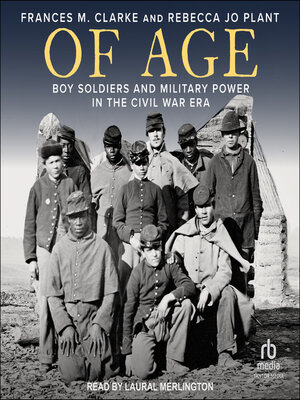Of Age
audiobook (Unabridged) ∣ Boy Soldiers and Military Power in the Civil War Era
By Frances M. Clarke

Sign up to save your library
With an OverDrive account, you can save your favorite libraries for at-a-glance information about availability. Find out more about OverDrive accounts.
Find this title in Libby, the library reading app by OverDrive.



Search for a digital library with this title
Title found at these libraries:
| Library Name | Distance |
|---|---|
| Loading... |
The smooth faces of boy soldiers stand out in Civil War photography. Yet until now, scholars have largely overlooked the masses of underaged youths who served as musicians, carried wounded from the field, ran messages, took up arms, and died in both the Union and Confederate armies.
Of Age is the first comprehensive study of how Americans responded to the unauthorized enlistment of minors in this conflict and the implications that followed. Frances M. Clarke and Rebecca Jo Plant offer military, legal, medical, social, political, and cultural perspectives as well as demographic analysis of this important aspect of the war. They find that underage enlistees comprised roughly ten percent of the Union army and likely a similar proportion of Confederate forces—but these enlistees' importance extended beyond sheer numbers. African American youths discovered that Union and Confederate officers ignored their age when using them as conscripts or military laborers. Meanwhile, nineteenth-century Americans expressed little concern over what exposure to violence might do to young minds, readily accepting their presence in battle.
An original and sweeping work, Of Age convincingly demonstrates why underage enlistment is such an important lens for understanding the history of children and youth and the transformative effects of the US Civil War.
Of Age is the first comprehensive study of how Americans responded to the unauthorized enlistment of minors in this conflict and the implications that followed. Frances M. Clarke and Rebecca Jo Plant offer military, legal, medical, social, political, and cultural perspectives as well as demographic analysis of this important aspect of the war. They find that underage enlistees comprised roughly ten percent of the Union army and likely a similar proportion of Confederate forces—but these enlistees' importance extended beyond sheer numbers. African American youths discovered that Union and Confederate officers ignored their age when using them as conscripts or military laborers. Meanwhile, nineteenth-century Americans expressed little concern over what exposure to violence might do to young minds, readily accepting their presence in battle.
An original and sweeping work, Of Age convincingly demonstrates why underage enlistment is such an important lens for understanding the history of children and youth and the transformative effects of the US Civil War.







